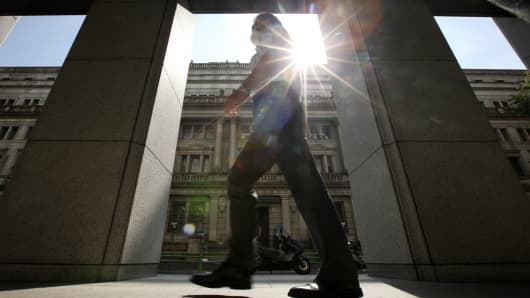The Bank of Japan (BOJ) ended a two-day meeting on Wednesday with a decision to leave monetary policy unchanged and a promise to monitor volatile bond markets in the wake of its radical monetary policy unveiled last month.
Speaking at the central bank's news conference, Governor Haruhiko Kuroda said the BOJ would respond with flexibility in its bond purchases and market operations.
Yields on benchmark 10-year Japanese government bonds, also known as JGBs, have doubled since the BOJ said in early April it would pump $1.4 trillion into the economy to boost inflation to 2 percent in two years. Yields rose after the BOJ's statement on Wednesday to around 0.896 percent.
"The bond market is telling us that there is confusion about what BOJ policy means – does the rise in yields mean that the BOJ is not successfully keeping bond yields down or does it mean that bond investors think the BOJ will be successful in reflating the economy and are starting to price bonds accordingly?," said Shane Oliver, chief economist at AMP Capital in Sydney.
"It [the BOJ] doesn't want to come out and say the back-up in bond yields is a positive sign because the whole aim of QE [quantitative easing] is to keep bond yields down," Oliver added. "So they're damned if they do, damned if they don't."
As expected, the BOJ left its monetary policy unchanged and maintained a commitment to increase base money – cash and deposits held at the central bank – at an annual pace of 60 to 70 trillion yen ($585 -$682 billion).
Japan, the world's third largest economy, is making a concerted bid to revive its economy and end two decades of deflation. Part of that effort is the BOJ pursuing an aggressive monetary policy that has taken the once cautious central bank into unchartered territory.
"They [BOJ policymakers] are doing this for the first time and the Fed [U.S. Federal Reserve] went through the same thing when they first introduced QE – yields ran away for the first three months before they got a handle on things," said Uwe Parpart, managing director at Reorient Financial Markets.
(Read More: Bernanke Expected to Deliver Dovish Message )
While the BOJ hopes that buying up a sizable chunk of domestic bonds will encourage Japanese investors to buy riskier assets such as equities, the concern is that the massive buying will dry up liquidity in the world's second biggest debt market and make it vulnerable to wild swings.
The other worry is that a sudden, sharp rise in yields could affect the interest payments on Japan's debt, which is estimated to reach 245 percent of gross domestic product this year - the highest in the world.
Watching Me, Watching You
The BOJ also said it would meet with bond market players on May 29.
"From the information I am getting the BOJ is already discussing this [JGB volatility]," said Nizam Idris, head of strategy for fixed income and currencies at Macquarie Bank in Singapore. "What's worse than not announcing something is to announce something that is not well thought out."
According to Idris, one concern is how that BOJ plans to buy 7 trillion yen worth of bonds a month, which may be difficult to achieve in months where there are redemptions for instance.
(Read More: This Is Now the World's Most Volatile Bond Market)
At the press conference, Kuroda said the BOJ could tweak its market operations to help stabilize the bond market.
"The BOJ could give itself some more flexibility to achieve that doubling in the monetary base by buying more bonds one month and less another. That could help stabilize the market," he said.
Reorient Financial Markets' Parpart agreed." "They should cut the [bond] purchases into smaller chunks and smooth out the market," he told CNBC's Capital Connection.
- By CNBC.Com's Dhara Ranasinghe, Follow her on Twitter: @DharaCNBC



